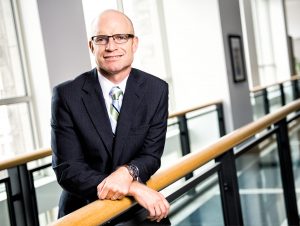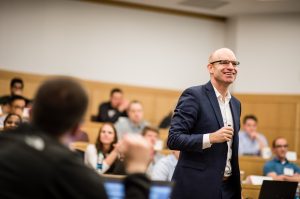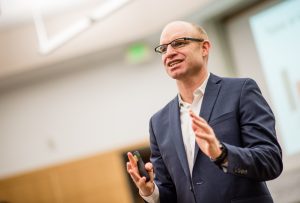M&O Alumni Highlights: Greg Fisher (‘12)
Greg Fisher’s road to entrepreneurship began at a job he hated.
Fisher, an Associate Professor of Entrepreneurship at the Kelley School of Business who earned his PhD in Strategic Management and Entrepreneurship from the Foster School of Business in 2012, was working as an auditor for Deloitte before the thought of a PhD or academic research ever crossed his mind.
However much Fisher disliked auditing firms, he loved the opportunity to ask anyone from the CEO down anything he wanted, he said.
“I became more and more intrigued by what accounted for firms’ variation in performance and the choices people could make to improve the performance of a firm,” Fisher said.
To fuel his curiosity, he enrolled in an MBA program at the Gordon Institute of Business Science, University of Pretoria in South Africa. Here, Fisher was exposed to the theory related to strategic management for the first time.
From Entrepreneur to PhD
The cases he worked to solve during his MBA program inspired him to start his own business, LearningLab, which delivers creative online learning solutions to corporate clients. Here, Fisher was exposed to the realities of the world of entrepreneurship.
“As an entrepreneur, I quickly realized I need to be a ‘jack-of-all-trades,’” Fisher said.
In one day, he might find himself updating the website, making sales calls, sending invoices and more. Fisher began to wonder how other entrepreneurs spent their time to give themselves the greatest chance of success.
And then there were the singular things that could fundamentally change LearningLab, like closing a deal with a substantial client.
“We went from a marginal to a substantial enterprise with a high-profile client,” he said. “It was amazing how within a few days the trajectory of the business changed, and it got me thinking more about the pivotal events that shift the trajectory of business.”
When LearningLab was sold a few years later, Fisher was invited back to teach at the Gordon Institute, where, for the first time, he began to contemplate a PhD in strategy and entrepreneurship.
Foster had just begun offering a new PhD program in Technology Entrepreneurship, one of only a few programs of its kind at the time. After visiting Seattle for the first time, he and his wife fell in love with the city.
A Teacher at His Roots
During his time at Foster, Fisher became the first student to receive an invitation to teach in the Executive MBA program and went on to teach in the program for two years before graduating.

Having experience teaching similar courses in South Africa and as a Teaching Assistant at Foster, Fisher had a good idea of what to expect.
“I was a teacher before I became interested in research,” Fisher said. “I also come from a family of teachers, so in some respect, it’s in my blood.”
Now, he teaches the core strategy class in the MBA program at the Kelley School of Business, working with full-time MBA students in the first semester of their program. Fisher also works closely with the Kelley Executive Education unit, where he teaches about corporate programs and works directly with firms on strategic issues and growth initiatives.
Teaching a Flipped Course
“Much of my approach to teaching is molded by what I learned from Suresh,” Fisher said of his teaching style, and former professor and advisor Suresh Kotha.
Fisher designs his MBA courses as “flipped courses,” where he provides lecture materials (typically in the form of videos) ahead of class, and in-class time is spent problem solving and discussing key topics. Fisher takes this popular method a step further.
“Because strategy necessitates integrating many different concepts and ideas simultaneously, I cover all the core concepts, theories, tools and frameworks in the first four or five classes,” Fisher said. “Then for the remainder of the semester, we integrate and apply those tools and concepts as we work through case studies of actual business challenges in class.”
Students work through case studies and confront a variety of real-world scenarios that allow them to work through complex and unstructured challenges. Through presentations, negotiations and in-class board meetings, his students are exposed to various elements of corporate life.
“This forces students to confront the messiness, ambiguity, and uncertainty of real-world analysis and strategic decision-making,” Fisher said.
Research at Foster
Fisher’s academic interests were driven by his experience as an entrepreneur and the challenges confronting entrepreneurs as they attempt to mitigate the uncertainty surrounding their ventures as they pitch them to venture capitalists and angel investors.
“My research was somewhat scattered while at [the University of Washington], but eventually I settled on studying resource acquisition for new ventures,” Fisher said. “This research interest led me down a few different paths examining new venture legitimacy, entrepreneurial behavior and crowdfunding.”
Every new seminar awakened a new interest, Fisher said. Organizational behavior seminars piqued his interest in the OB side of entrepreneurship and his interests began to shift.
“Everything I learned about seemed to have exciting research opportunities,” he said.
An Emerging Scholar’s Current Research
This past summer, at the annual Academy of Management Conference in Chicago, Fisher was awarded the Emerging Scholars Award from the AOM Entrepreneurship Division. The award is meant to encourage, reward and provide research support for emerging scholars in the division.
“The award goes to individuals who demonstrate an emerging record of scholarship within their first 6 years post-PhD that has the potential to make innovative and impactful contributions to the body of entrepreneurship research,” Fisher explained.
Of 22 nominations, Fisher was among three recipients honored and selected to present an overview of their research at the conference.
“It was a real honor to get this award, and it was even better to get it with two other people – Laura [Huang from Harvard] and Matthew [Grimes from Cambridge] – who have been good academic friends throughout this journey,” Fisher said.
Fisher is currently is working on several research projects, one of which is examining crowdfunding processes and outcomes with his former advisor, Suresh Kotha, and recent Foster PhD graduate, Alex Murray.
“We are interested in community and process elements of raising funds for entrepreneurial ventures from distributed crowds of non-professional resource providers,” Fisher said. “We examine what entrepreneurs do over time to be successful in raising funds via crowdfunding, and what can go wrong.”
Fisher is also studying issues related to launching new ventures in the context of an emerging market category, considering how entrepreneurs create a venture and a market simultaneously and unpacking what can go wrong in this process. For this, he is focusing on the emergence of the online grocery market, accelerators and mud-runs.
His third stream of research looks at entrepreneurial behavior and action – what entrepreneurs do in the early stages of the entrepreneurial process. These projects focus on their timing of actions, the types of actions that they take, and the extent to which they depend on others in the very early stages of the entrepreneurial process.
“Almost all the work I do now is a direct extension of the things I started while I was at UW,” Fisher said.
And to supplement all of that work, Fisher runs.
With over 50 marathons, 15 ultra-marathons and many more half-marathons under his belt, he finds running to be a great complement to his academic life.
“It is a great time to think and process ideas, and it reduces stress and keeps me sane,” Fisher said.
*Photos courtesy of the Kelley School of Business.
